
7 minute read
Georgia RESA Summit
Teaching to the Souls of Children
Georgia RESA Summit Takes Square Aim at Student Poverty
By Meg Thornton, PAGE Publications Manager
This year’s annual conference of the Georgia Regional Education Service Agencies took aim at the crippling epidemic of student poverty in our state. It also provided educators with strategies on breaking through to the hearts and minds of impoverished students.
“The growing incidence of poverty among our public school students has profoundly changed the scope of services that RESAs are asked to provide in support to our schools. Unfortunately, these demands for enhanced services for our neediest students come at a time when resources are greatly diminished,” stated the conference program.
Taking a holistic approach, the 2015 Georgia RESA Summit, subtitled “Beacons of Hope,” provided attendees with strong data detailing the alarming increase of childhood poverty in Georgia, as well as its devastating impact on student achievement. For inspiration, the program also highlighted some K-12 schools that, having applied the principles expounded in PAGE professional learning academies, have developed a disciplined framework for designing student work and have made impressive strides in student engagement.
Keynote presentations by executives of the Georgia Budget and Policy Institute and the Southern Education Foundation highlighted the massive state budget cuts incurred by Georgia public schools in recent years, as well as the alarming growth of poverty. Since 2002, state funding per student has declined 12 percent in inflation-adjusted dollars.
Furthermore, between 2008 and 2013 in Georgia: • The tax digest fell in nearly 90 percent of school districts by an average of 21.7 percent in inflation-adjusted dollars. • 135 districts raised millage rates. • Local revenues fell in 89 districts by an average of 20 percent; these districts enroll nearly 80 percent of all students.
At the same time, poverty rates in the state have soared. Georgia ranks sixth in the nation in childhood poverty, according to 2013 U.S. Census Bureau data. Nearly two out of three of Georgia’s 1.68 million public school students — 62 percent — are low income, according to the National Center for Education Statistics.
THE ‘HIDDEN RULES’
In a session titled “Teaching Teachers about Children in Generational Poverty,” Maggie Glennon of Middle Georgia RESA, spoke on the juxtaposition of the “hidden rules” of impoverished families vs. those of the middle class.
Schools and workplaces operate according to middle class values. To be successful in school and beyond, one must follow middle class rules. However, “people in poverty live their lives much differently than middle class people,” said Glennon. For disadvantaged children to be successful, adults, such as teachers, must explicitly
teach them the hidden rules of society. Whereas middle class students learn from parents and others to show up on time, dress appropriately, use appropriate words and be respectful, children who hail from generational poverty often have very limited exposure to these codes of conduct.
Educators must be acutely aware of both sets of hidden rules and of their own aversion to violations of their own rules so that, rather than be offended by a child’s unruly behavior, we make a conscious effort to teach them how to alter their behavior to achieve success.
“When a student ‘pushes your button,’ it usually means that he or she broke one of your hidden rules,” said Glennon.
Children in poverty typically start school behind middle class children because they have much smaller vocabularies, have difficulty express-
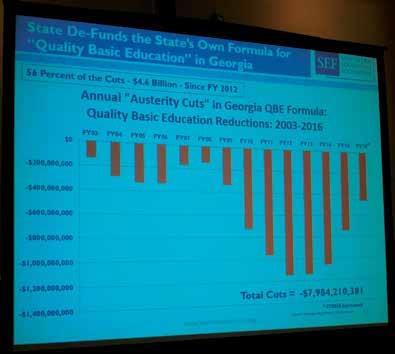
Continued on page 18
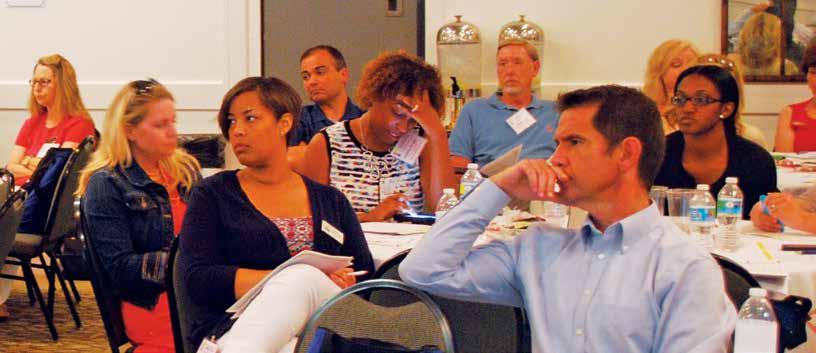
Brooks County High School presenters and staff, (l-r): teacher Alyce Solomon; Superintendent Owen Clemons; teacher Anya Cain; Principal Dr. Elena Ponder; teacher Lori Studstill and teacher Jarod Perry. s

ing emotions in words and have limited background knowledge, said Glennon.
In summary, Glennon said, “It’s not about right or wrong; it is about different. It’s not about race; it’s about poverty. It’s not about ‘them’ and ‘us;’ it’s about all of us. … It is about being successful with two sets of rules.”
‘TEACH TO THE SOUL OF CHILDREN’
In an inspirational keynote speech, Dr. Hayward Cordy, executive director of Oconee RESA, related that we must “teach to the soul of children.”
We must influence their thoughts: “My struggles make me strong. My condition is

temporary. If it is to be, it’s up not schooled, emphasized educato me.” tion. Report card day was monu-
We must influence their mental. If a child had a grade will: “I am willing to sow now lower than A, his father would to reap later. I will do my part boom, “You better pull it up.” to succeed. I control me.” A chronic stutterer, young
And we must influence Cordy had low self-esteem and their emotions: “Life can saw himself as “damaged goods,” change for me; there is hope. I am unique and created with Dr. Hayward Cordy like the discounted dented cans of vegetables and old meats that a purpose. My decisions will his family sought for survival. shape my life and change my world.” Hence the name of Cordy’s recently pub-
Cordy knows of what he speaks. He lished book, “Damaged Goods,” which grew up in abject poverty in a family of chronicles his difficult journey to becoming 13 children and sharecropper parents in an admired teacher and superintendent in rural Johnson County. The six-room tenant Jenkins and Johnson county school dishouse had no bathroom. His father, though tricts. “He learned that life was not always 1 fair, but that he determined his destiny,” wrote PAGE Executive Director Dr. Allene Magill in the forward to “Damaged Goods.” Cordy, a member of the PAGE Board of Directors, “has spent his entire life giving to others … regardless of their background, race or abilities. He understands that children must be respected, valued and given the opportunity to learn and be successful,” Magill added.
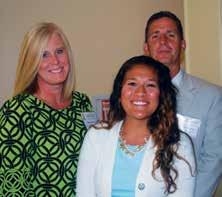
Photography by Meg Thornton
2

3

4
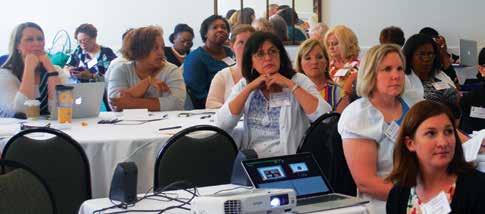
The 2015 RESA summit was hosted by First District RESA, which serves 18 school systems in southeast Georgia. “The challenge of student poverty has profoundly changed the scope of services that RESAs are called to provide,” said Dr. Whit Myers, executive director of First District RESA. “We trust that the 2015 Summit provided RESAs with information and support for becoming even brighter beacons of hope for Georgia’s teachers and students.” n
8

6

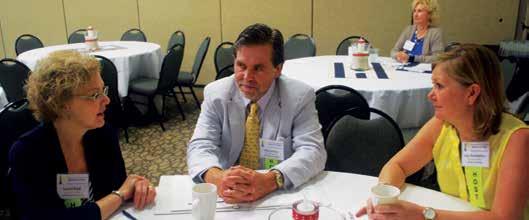
7


1. From left, Aaron Cohn Middle School (Muscogee) teachers Denise Fox and Karissa Castillo with Principal Richard Green. 2 From left, PAGE Executive Director Dr. Allene Magill and a panel of educators: Principal Ivy Smith and teacher Sam Clemons Jr., Pine Grove Middle (Lowndes); Principal Janet Hendley, teacher Mica Merriman and teacher Patricia Burk, Hahira Middle (Lowndes); and Principal Jennifer Hayes, Red Bud Middle (Calhoun). 3. From left, Kimberly Thorpe, Metro RESA; Holly Mauney and Jan Black, Pioneer RESA; Nichole Moulton, Oconee RESA; Susan Proctor and Marcia Williams, Pioneer RESA; and Lisa Dean and Cathy Mayberry, Oconee RESA. 4. Gene Christie of Coastal Plains RESA (left) with Brooks County Superintendent Owen Clemons. 5. The annual summit was hosted by 1st District RESA. From left, Dr. Trudy Sharpe, Wayne Greenway, Dr. Chris Garretson, Leslie Mills, Dave Rutz, Dr. Lisa Burkhalter and Dr. Whit Myers 6. Red Bud Middle (Calhoun) Principal Jennifer Hayes (center) with teachers Christy Martin and Matt Fox. 7. Claire Suggs, senior education policy analyst, Georgia Budget and Policy Institute. 8. From left, Laura Kipp, Dr. Alex Jordan and Dr. Lisa Burkhalter of 1st District RESA.







